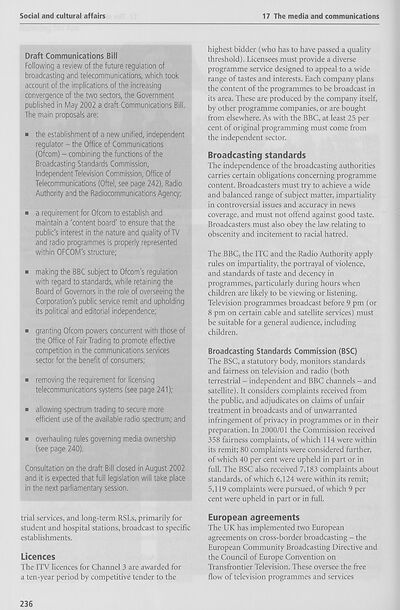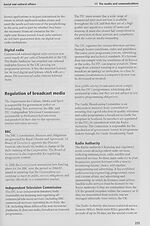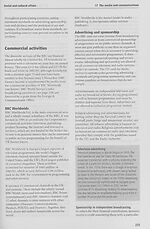Download files
Complete book:
Individual page:
Thumbnail gallery: Grid view | List view

Social and cultural affairs
17 The media and communications
Draft Communications Bill
Following a review of the future regulation of
broadcasting and telecommunications, which took
account of the implications of the increasing
convergence of the two sectors, the Government
published in May 2002 a draft Communications Bill.
The main proposals are:
■ the establishment of a new unified, independent
regulator - the Office of Communications
(Ofcom) - combining the functions of the
Broadcasting Standards Commission,
Independent Television Commission, Office of
Telecommunications (Oftel, see page 242), Radio
Authority and the Radiocommunications Agency;
■ a requirement for Ofcom to establish and
maintain a 'content board' to ensure that the
public's interest in the nature and quality of TV
and radio programmes is properly represented
within OFCOM's structure;
■ making the BBC subject to Ofcom's regulation
with regard to standards, while retaining the
Board of Governors in the role of overseeing the
Corporation's public service remit and upholding
its political and editorial independence;
■ granting Ofcom powers concurrent with those of
the Office of Fair Trading to promote effective
competition in the communications services
sector for the benefit of consumers;
■ removing the requirement for licensing
telecommunications systems (see page 241);
■ allowing spectrum trading to secure more
efficient use of the available radio spectrum; and
■ overhauling rules governing media ownership
(see page 240).
Consultation on the draft Bill dosed in August 2002
and it is expected that full legislation will take place
in the next parliamentary session.
trial services, and long-term RSLs, primarily for
student and hospital stations, broadcast to specific
establishments.
Licences
The ITV licences for Channel 3 are awarded for
a ten-year period by competitive tender to the
highest bidder (who has to have passed a quality
threshold). Licensees must provide a diverse
programme service designed to appeal to a wide
range of tastes and interests. Each company plans
the content of the programmes to be broadcast in
its area. These are produced by the company itself,
by other programme companies, or are bought
from elsewhere. As with the BBC, at least 25 per
cent of original programming must come from
the independent sector.
Broadcasting standards
The independence of the broadcasting authorities
carries certain obligations concerning programme
content. Broadcasters must try to achieve a wide
and balanced range of subject matter, impartiality
in controversial issues and accuracy in news
coverage, and must not offend against good taste.
Broadcasters must also obey the law relating to
obscenity and incitement to racial hatred.
The BBC, the ITC and the Radio Authority apply
rules on impartiality, the portrayal of violence,
and standards of taste and decency in
programmes, particularly during hours when
children are likely to be viewing or listening.
Television programmes broadcast before 9 pm (or
8 pm on certain cable and satellite services) must
be suitable for a general audience, including
children.
Broadcasting Standards Commission (BSC)
The BSC, a statutory body, monitors standards
and fairness on television and radio (both
terrestrial - independent and BBC channels - and
satellite). It considers complaints received from
the public, and adjudicates on claims of unfair
treatment in broadcasts and of unwarranted
infringement of privacy in programmes or in their
preparation. In 2000/01 the Commission received
358 fairness complaints, of which 114 were within
its remit; 80 complaints were considered further,
of which 40 per cent were upheld in part or in
full. The BSC also received 7,183 complaints about
standards, of which 6,124 were within its remit;
5,119 complaints were pursued, of which 9 per
cent were upheld in part or in full.
European agreements
The UK has implemented two European
agreements on cross-border broadcasting - the
European Community Broadcasting Directive and
the Council of Europe Convention on
Transfrontier Television. These oversee the free
flow of television programmes and services
236
17 The media and communications
Draft Communications Bill
Following a review of the future regulation of
broadcasting and telecommunications, which took
account of the implications of the increasing
convergence of the two sectors, the Government
published in May 2002 a draft Communications Bill.
The main proposals are:
■ the establishment of a new unified, independent
regulator - the Office of Communications
(Ofcom) - combining the functions of the
Broadcasting Standards Commission,
Independent Television Commission, Office of
Telecommunications (Oftel, see page 242), Radio
Authority and the Radiocommunications Agency;
■ a requirement for Ofcom to establish and
maintain a 'content board' to ensure that the
public's interest in the nature and quality of TV
and radio programmes is properly represented
within OFCOM's structure;
■ making the BBC subject to Ofcom's regulation
with regard to standards, while retaining the
Board of Governors in the role of overseeing the
Corporation's public service remit and upholding
its political and editorial independence;
■ granting Ofcom powers concurrent with those of
the Office of Fair Trading to promote effective
competition in the communications services
sector for the benefit of consumers;
■ removing the requirement for licensing
telecommunications systems (see page 241);
■ allowing spectrum trading to secure more
efficient use of the available radio spectrum; and
■ overhauling rules governing media ownership
(see page 240).
Consultation on the draft Bill dosed in August 2002
and it is expected that full legislation will take place
in the next parliamentary session.
trial services, and long-term RSLs, primarily for
student and hospital stations, broadcast to specific
establishments.
Licences
The ITV licences for Channel 3 are awarded for
a ten-year period by competitive tender to the
highest bidder (who has to have passed a quality
threshold). Licensees must provide a diverse
programme service designed to appeal to a wide
range of tastes and interests. Each company plans
the content of the programmes to be broadcast in
its area. These are produced by the company itself,
by other programme companies, or are bought
from elsewhere. As with the BBC, at least 25 per
cent of original programming must come from
the independent sector.
Broadcasting standards
The independence of the broadcasting authorities
carries certain obligations concerning programme
content. Broadcasters must try to achieve a wide
and balanced range of subject matter, impartiality
in controversial issues and accuracy in news
coverage, and must not offend against good taste.
Broadcasters must also obey the law relating to
obscenity and incitement to racial hatred.
The BBC, the ITC and the Radio Authority apply
rules on impartiality, the portrayal of violence,
and standards of taste and decency in
programmes, particularly during hours when
children are likely to be viewing or listening.
Television programmes broadcast before 9 pm (or
8 pm on certain cable and satellite services) must
be suitable for a general audience, including
children.
Broadcasting Standards Commission (BSC)
The BSC, a statutory body, monitors standards
and fairness on television and radio (both
terrestrial - independent and BBC channels - and
satellite). It considers complaints received from
the public, and adjudicates on claims of unfair
treatment in broadcasts and of unwarranted
infringement of privacy in programmes or in their
preparation. In 2000/01 the Commission received
358 fairness complaints, of which 114 were within
its remit; 80 complaints were considered further,
of which 40 per cent were upheld in part or in
full. The BSC also received 7,183 complaints about
standards, of which 6,124 were within its remit;
5,119 complaints were pursued, of which 9 per
cent were upheld in part or in full.
European agreements
The UK has implemented two European
agreements on cross-border broadcasting - the
European Community Broadcasting Directive and
the Council of Europe Convention on
Transfrontier Television. These oversee the free
flow of television programmes and services
236
Set display mode to:
![]() Universal Viewer |
Universal Viewer | ![]() Mirador |
Large image | Transcription
Mirador |
Large image | Transcription
The item on this page appears courtesy of Office for National Statistics and may be re-used under the Open Government Licence for Public Sector Information.
| Britain and UK handbooks > UK: The official yearbook of the United Kingdom of Great Britain and Northern Ireland > 2003 > (266) |
|---|
| Permanent URL | https://digital.nls.uk/204926568 |
|---|
| Attribution and copyright: |
|
|---|---|
| Description | Three volumes of 'UK: The official yearbook of the United Kingdom of Great Britain and Northern Ireland', published annually by the Office of National Statistics from 2002-2005. |
|---|---|
| Shelfmark | GII.11 SER |
| Description | Three titles produced by the British Government from 1954-2005 describing 'how Britain worked'. They are: 'Britain: An official handbook' (1954-1998), 'Britain: The official yearbook of the United Kingdom' (1999-2001), and 'UK: The official yearbook of the United Kingdom of Great Britain and Northern Ireland' (2002-2005). These 50 reports provide an overview of Britain's economic, social and cultural affairs, its environment, international relations, and the systems of government. They give an impartial summary of government policies and initiatives, and explain how public services are organised. |
|---|---|
| Additional NLS resources: |
|

